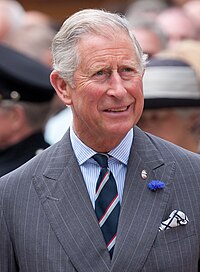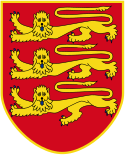
The Channel Islands are an archipelago in the English Channel, off the French coast of Normandy. They are divided into two Crown Dependencies: the Bailiwick of Jersey, which is the largest of the islands; and the Bailiwick of Guernsey, consisting of Guernsey, Alderney, Sark, Herm and some smaller islands. Historically, they are the remnants of the Duchy of Normandy. Although they are not part of the United Kingdom, the UK is responsible for the defence and international relations of the islands as it is for the other Crown Dependency, the Isle of Man, and the British Overseas Territories. The Crown Dependencies are neither members of the Commonwealth of Nations, nor part of the European Union. They have a total population of about 171,916, and the bailiwicks' capitals, Saint Helier and Saint Peter Port, have populations of 33,500 and 18,207 respectively.

The history of Guernsey stretches back with evidence of Neolithic occupation, followed by Roman occupation. Christianity was brought to Guernsey by St Sampson.

Jersey – the largest of the Channel Islands – has been an island for around 6,000 years. Early inhabitation is evidenced by various neolithic monuments and hoards. In the 10th century, Jersey became part of Normandy. When the Normans conquered England in the 11th century, Jersey remained a part of the Duchy of Normandy, but when Normandy and England were finally split in the 13th century, the Channel Islands remained loyal to the English Crown, splitting Jersey politically from mainland Normandy.

The Bailiwick of Jersey is a British Crown dependency, unitary state and parliamentary representative democracy and constitutional monarchy. Since 2005, Jersey has a system of ministerial government, with a Chief Minister and Council of Ministers appointed from among the 49 elected members of the States Assembly. The Bailiff is chief judge, President of the States Assembly, and civic head. The current monarch and head of state is King Charles III.

Normandy is a geographical and cultural region in northwestern Europe, roughly coextensive with the historical Duchy of Normandy.

Duke is a male title either of a monarch ruling over a duchy, or of a member of royalty, or nobility. As rulers, dukes are ranked below emperors, kings, grand princes, grand dukes, and above sovereign princes. As royalty or nobility, they are ranked below princes and grand dukes. The title comes from French duc, itself from the Latin dux, 'leader', a term used in republican Rome to refer to a military commander without an official rank, and later coming to mean the leading military commander of a province. In most countries, the word duchess is the female equivalent.

The Crown Dependencies are three offshore island territories in the British Islands that are self-governing possessions of the British Crown: the Bailiwick of Guernsey and the Bailiwick of Jersey, both located in the English Channel and together known as the Channel Islands, and the Isle of Man in the Irish Sea between Great Britain and Ireland.
The Bailiff is the chief justice in each of the Channel Island bailiwicks of Guernsey and Jersey, also serving as president of the legislature and having ceremonial and executive functions. Each bailiwick has possessed its own bailiff since the islands were divided into two jurisdictions in the 13th century. The bailiffs and deputy bailiffs are appointed by the Crown on the advice of the Secretary of State for Justice and may hold office until retirement age.
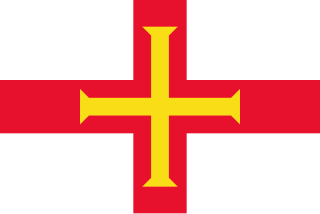
The Bailiwick of Guernsey is a self-governing British Crown Dependency off the coast of Normandy, France, comprising several of the Channel Islands. It has a total land area of 78 square kilometres (30 sq mi) and an estimated total population of 67,334.

The Duchy of Normandy grew out of the 911 Treaty of Saint-Clair-sur-Epte between King Charles III of West Francia and the Viking leader Rollo. The duchy was named for its inhabitants, the Normans.
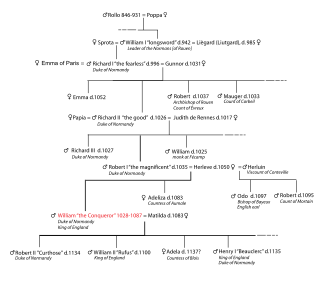
In the Middle Ages, the duke of Normandy was the ruler of the Duchy of Normandy in north-western France. The duchy arose out of a grant of land to the Viking leader Rollo by the French king Charles the Simple in 911. In 924 and again in 933, Normandy was expanded by royal grant. Rollo's male-line descendants continued to rule it until 1135, and cognatic descendants ruled it until 1204. In 1202 the French king Philip II declared Normandy a forfeited fief and by 1204 his army had conquered it. It remained a French royal province thereafter, still called the Duchy of Normandy, but only occasionally granted to a duke of the royal house as an appanage.
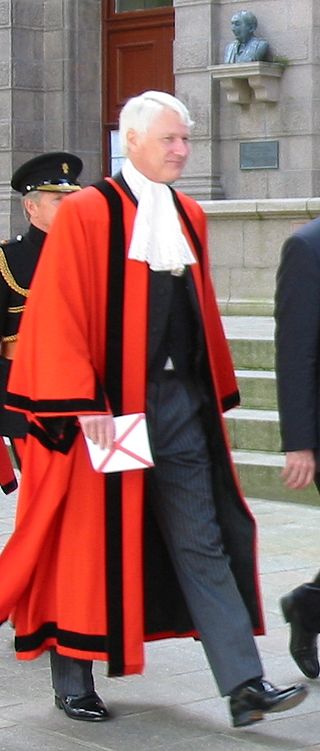
The Bailiff of Jersey has several roles:
A bailiwick is usually the area of jurisdiction of a bailiff, and once also applied to territories in which a privately appointed bailiff exercised the sheriff's functions under a royal or imperial writ.

The lieutenant governor of Jersey, properly styled the lieutenant-governor of Jersey, is the representative of the British monarch in the Bailiwick of Jersey, a dependency of the British Crown.

The coat of arms of Jersey is the heraldic device consisting of a shield charged with three gold lions on a red field. Utilised unofficially before the 20th century, its status as the coat of arms of the Bailiwick of Jersey was formalized in 1907. The escutcheon is featured on the flag of the dependency.
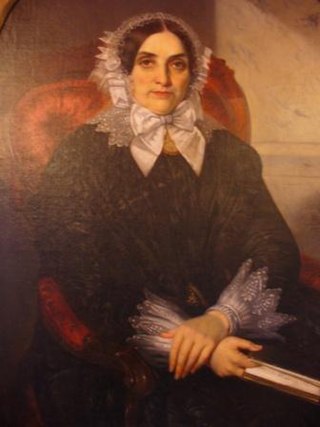
A seigneur or lord is an originally feudal title in France before the Revolution, in New France and British North America until 1854, and in the Channel Islands to this day. The seigneur owned a seigneurie, seigneury, or lordship—a form of title or land tenure—as a fief, with its associated obligations and rights over person and property. In this sense, a seigneur could be an individual—male or female, high or low-born—or a collective entity, typically a religious community such as a monastery, seminary, college, or parish. In the wake of the French Revolution, seigneurialism was repealed in France on 4 August 1789 and in the Province of Canada on 18 December 1854. Since then, the feudal title has only been applicable in the Channel Islands and for sovereign princes by their families.

The Law of Guernsey originates in Norman customary law, overlaid with principles taken from English common law and French law, as well as from statute law enacted by the competent legislature(s) – usually, but not always, the States of Guernsey.
This is a list of charters promulgated by monarchs of England that specifically relate to the islands of Jersey, Guernsey, Alderney or Sark which together form the Channel Islands, also known as the Bailiwick of Jersey and the Bailiwick of Guernsey.
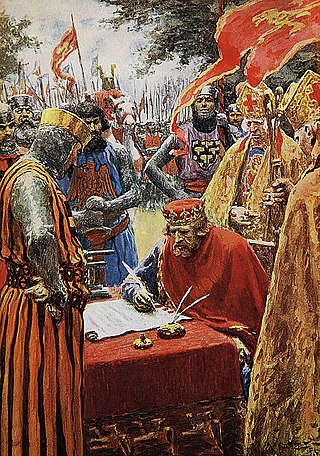
The Bailiwick of Jersey has an unwritten constitution arising from the Treaty of Paris (1259). When Henry III and the King of France came to terms over the Duchy of Normandy, the Norman mainland the suzerainty of the King of France. The Channel Islands however remained loyal to the British crown due to the loyalties of its Seigneurs. But they were never absorbed into the Kingdom of England by any Act of Union and exist as "peculiars of the Crown".
From the Middle Ages, the Channel Islands were administered according to a feudal system. Alongside the parishes of Jersey and Guernsey, the fief provided a basic framework for rural life; the system began with the Norman system and largely remained similar to it. Feudalism has retained a more prominent role in the Channel Islands than in the UK. The Channel Islands are remnants of the Duchy of Normandy and are held directly by the crown on a feudal basis as they are self-governing possessions of the British Crown. This peculiarity underscores the deep-seated influence of feudalism in the Channel Islands; their allegiance is not so much to England but rather directly to the monarch.

